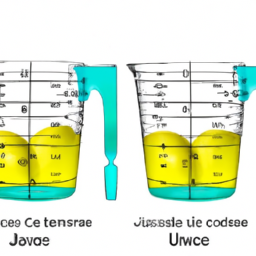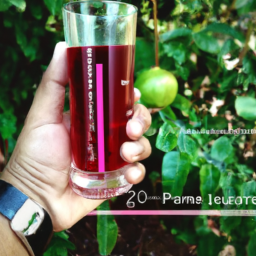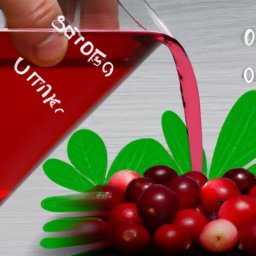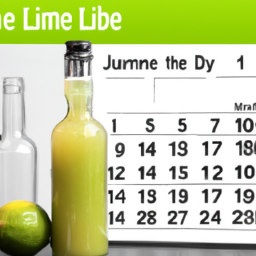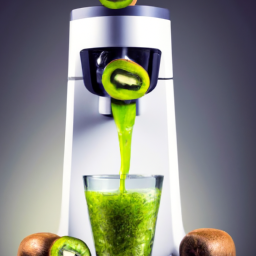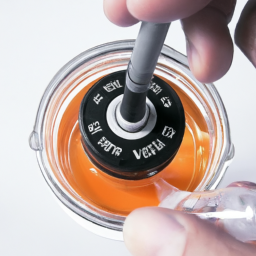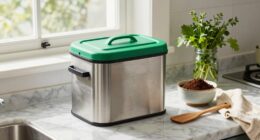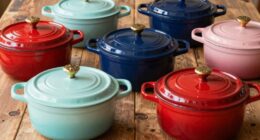As a cooking enthusiast and culinary artist, I appreciate the importance of precise ingredient measurements when following recipes. One ingredient that can be tricky to measure accurately is lemon juice. The amount of juice extracted from a lemon can vary depending on factors like the fruit’s size, ripeness, and juiciness, making it challenging to determine the exact quantity needed for a dish.
In this article, I will provide information and tips on how to measure lemon juice accurately and how much bottled lemon juice can be used as a substitute for fresh lemon juice. Lemon juice is a versatile ingredient that is used in a variety of dishes, from salad dressings and marinades to desserts and cocktails.
However, using too much or too little lemon juice can significantly impact the flavor and texture of a dish. That’s why it is essential to know how much lemon juice equals the juice of one lemon, whether you are using fresh lemons or bottled juice.
By understanding the measurements and techniques for extracting and using lemon juice, you can ensure that your recipes turn out perfectly every time.
Key Takeaways
- The average juice yield for small, medium, and large lemons is 2, 3, and 4-5 tablespoons, respectively.
- The conversion ratio of 1:1 can be used to substitute bottled lemon juice for fresh lemon juice.
- Bottled lemon juice may have added preservatives and different flavor profile than fresh lemon juice.
- Understanding how much lemon juice equals the juice of one lemon is important for converting lemon juice measurements in recipes.
Importance of Measuring Lemon Juice Accurately in Recipes
Accurately measuring lemon juice in recipes is crucial for achieving the desired flavor profile, so it’s important to know how much juice one lemon yields. The importance of precision cannot be overstated when it comes to cooking and baking.
Too little or too much lemon juice can make or break a dish, so knowing the exact amount required is key. Techniques for measuring accurately include using a citrus juicer, hand-squeezing the lemon, or using a measuring cup.
When using a citrus juicer, make sure to remove any seeds and measure the juice directly into a measuring cup. Hand-squeezing the lemon can also be effective, but be sure to strain the juice to remove any seeds or pulp. And when using a measuring cup, make sure to level off the top to ensure accuracy.
With these techniques in mind, you’ll be able to accurately measure lemon juice in your recipes and achieve the desired flavor profile. Now let’s move onto how to extract lemon juice from fresh lemons.
How to Extract Lemon Juice from Fresh Lemons
You can easily get the tangy and refreshing taste of fresh lemon by following these simple steps. First, wash the lemon thoroughly to remove any dirt or residue.
Then, cut the lemon in half and use a lemon squeezer or juicer to extract the juice. Alternatively, you can also use a fork to press the lemon halves and extract the juice manually.
Using fresh lemon juice has many benefits. It adds a bright and zesty flavor to dishes and can also provide health benefits such as aiding digestion and boosting immunity. Additionally, using fresh lemon juice allows for more control over the amount and intensity of the lemon flavor in a recipe.
Experiment with different methods to extract lemon juice and find the one that works best for you.
When it comes to accurately measuring lemon juice in recipes, it’s important to know how much juice is in one lemon.
How Much Juice is in One Lemon?
I’ve noticed that the amount of juice I can get from a lemon can vary quite a bit depending on many different factors. Some of these factors include the ripeness of the lemon, how much pressure I apply when squeezing it, and even the size of the lemon itself.
In this discussion, I’ll be exploring the average juice yield for different sizes of lemons and the factors that can affect how much juice you can extract from them.
Factors Affecting Juice Yield
Getting the most juice out of a lemon can be affected by various factors, such as the ripeness of the fruit and the method of extraction. Factors affecting extraction are mostly related to the physical properties of lemons. For instance, the amount of pectin in the fruit affects how easily the juice can be extracted. Pectin is a type of fiber that binds the cells together, making it difficult to extract the juice. If a lemon is too ripe, it can also be difficult to extract the juice because the cells have started to break down and lose their structure.
Another factor that affects juice yield is the method of extraction. Hand-squeezing is the most common method of extraction, but it is not the most efficient. Using a citrus squeezer or a juicer can be more effective as they can extract more juice from the fruit. Table 1 below shows the average juice yield for different sizes of lemons using different methods of extraction.
| Lemon Size | Hand-Squeezed | Citrus Squeezer | Juicer |
|---|---|---|---|
| Small | 1 Tbsp | 2 Tbsp | 2.5 Tbsp |
| Medium | 2 Tbsp | 3 Tbsp | 4 Tbsp |
| Large | 3 Tbsp | 4 Tbsp | 5 Tbsp |
Understanding the factors that affect juice yield can help maximize the amount of juice extracted from lemons. However, it is also important to note that the average juice yield for different sizes of lemons can vary. In the next section, we will explore how much lemon juice equals the juice of one lemon.
Average Juice Yield for Different Sizes of Lemons
When picking out lemons, it’s helpful to know the average amount of juice you can expect to get based on the size of the fruit. Juice extraction from lemons is affected by various factors, such as the ripeness, variety, and size of the fruit. Among these, size is one of the most important factors that determine the amount of juice you can extract from a lemon.
On average, a small lemon that weighs around 2 ounces can yield about 2 tablespoons of juice, while a medium-sized lemon that weighs around 3 ounces can yield about 3 tablespoons of juice. A large lemon that weighs around 4 to 5 ounces can yield about 4 to 5 tablespoons of juice.
However, it’s worth noting that juice yield can vary depending on the variety of lemon, as some varieties are more acidic and juicier than others. For instance, Meyer lemons are known for their sweeter and less acidic flavor, but they also have a lower juice yield compared to Eureka or Lisbon lemons.
When it comes to substituting bottled lemon juice for fresh lemon juice, it’s important to keep in mind that bottled lemon juice may have added preservatives and a different flavor profile compared to fresh lemon juice. Nonetheless, if you don’t have access to fresh lemons, you can use bottled lemon juice as a substitute by using a conversion ratio of 1:1.
This means that if a recipe calls for the juice of one fresh lemon, you can use 2 tablespoons of bottled lemon juice instead.
How to Substitute Bottled Lemon Juice for Fresh Lemon Juice
When it comes to substituting bottled lemon juice for fresh lemon juice, there are a few key points to keep in mind. First, there will likely be differences in flavor between the two.
Second, the bottled juice may have a higher or lower acid content than fresh lemon juice.
Finally, it’s important to adjust for concentration, as bottled juice is often more concentrated than fresh juice.
As someone who frequently cooks with lemons, I’ve found it helpful to understand these differences in order to achieve the desired flavor and acidity in my dishes.
Differences in Flavor
You’ll be pleasantly surprised by the subtle variations in flavor that using fresh lemon juice versus bottled lemon juice can bring to your dishes. Fresh lemon juice has a bright, tangy flavor that is hard to replicate with bottled juice. This is because bottled juice is often made from concentrate and contains additives that can alter the taste.
On the other hand, fresh lemon juice contains natural oils and acids that give it a unique and refreshing taste. Aside from flavor variations, using fresh lemon juice also has health benefits. Lemons are a good source of vitamin C and antioxidants, which can boost your immune system and help prevent chronic diseases.
Bottled lemon juice, on the other hand, may contain added sugars or preservatives that can be harmful to your health. That’s why it’s always best to use fresh lemon juice whenever possible. Moving on to the next subtopic, let’s explore the differences in acid content between fresh and bottled lemon juice.
Differences in Acid Content
With fresh lemons, the tartness of the juice is more pronounced than in bottled varieties, providing a zesty kick to your dishes that can’t be beat. This is because fresh lemons are more acidic than bottled lemon juice.
Lemons are considered acidic fruits because they have a low pH level, ranging from 2 to 2.6. The acidity of the fruit is what gives it its tart taste and also plays a role in its health benefits. The high acidity of lemons makes them beneficial for digestion and can help reduce inflammation in the body. Lemon juice is also a good source of vitamin C, which is essential for immune health and skin health.
However, it’s important to note that too much acidity can be harmful to tooth enamel and can exacerbate acid reflux symptoms. When using fresh lemon juice in recipes, it’s important to adjust for the concentration of acid to ensure the right balance of flavors and to avoid any negative health effects.
Adjusting for Concentration
In addition to differences in acid content, another factor to consider when determining how much lemon juice equals the juice of one lemon is concentration. Concentration refers to the amount of a substance, in this case lemon juice, present in a given volume of liquid.
To adjust for concentration, it may be necessary to dilute or concentrate the lemon juice accordingly. This can be done by adding water to dilute the juice or by reducing the water content to concentrate it.
Adjusting for concentration is important not only for accuracy in measuring the amount of lemon juice needed in a recipe, but also for balancing flavors and adjusting for sweetness. By making sure the concentration of lemon juice is correct, the flavor of the dish can be balanced with the other ingredients, ensuring the perfect taste.
Now, let’s move on to the next section and explore how much bottled lemon juice equals the juice of one lemon.
How Much Bottled Lemon Juice Equals the Juice of One Lemon?
If you’re wondering how much bottled lemon juice is equivalent to the juice of one lemon, it’s about two tablespoons.
Using bottled lemon juice can be a convenient and time-saving option, especially when fresh lemons are not available. Additionally, bottled lemon juice typically has a longer shelf life and can be easier to measure out for recipes.
However, it’s important to be aware of the risks of consuming too much bottled lemon juice. Some brands may contain added preservatives or sweeteners that can impact the taste and nutritional value. It’s always best to check the label for any additional ingredients and to use in moderation.
With this in mind, understanding how much bottled lemon juice equals the juice of one lemon can make it easier to convert lemon juice measurements in recipes.
Converting Lemon Juice Measurements in Recipes
Now that we know how much bottled lemon juice equals the juice of one lemon, let’s talk about how to convert lemon juice measurements in recipes. Measuring accuracy is crucial when it comes to recipe consistency, and using the right amount of lemon juice can make or break a dish.
When a recipe calls for the juice of one lemon, it typically means about 2-3 tablespoons of juice. However, this can vary depending on the size and juiciness of the lemon. To ensure accuracy, it’s best to measure the juice using a tablespoon or a measuring cup. If you don’t have a measuring tool, you can estimate that one medium-sized lemon will yield about 2 tablespoons of juice.
Keep in mind that the amount of juice can also vary depending on how you extract it – using a juicer or squeezing by hand can yield different amounts. By paying attention to these details, you can ensure that your recipe turns out just right.
Now that we’ve covered how to measure lemon juice accurately, let’s move on to tips for storing fresh lemon juice.
Tips for Storing Fresh Lemon Juice
When I have leftover fresh lemon juice, I always make sure to store it properly to ensure its freshness.
One option is to refrigerate the lemon juice in an airtight container for up to a week.
Another option is to freeze the juice in ice cube trays and then transfer the frozen cubes to a freezer-safe bag for up to 6 months.
Additionally, you can preserve the lemon juice by adding citric acid and storing it in sterilized jars for longer shelf life.
Refrigeration
Although it may seem like a hassle, refrigerating leftover lemon juice is necessary to prevent it from spoiling quickly and wasting the juice of one lemon. Lemon juice is highly acidic and can go bad or mold quickly if left at room temperature. Therefore, storing it in the fridge is the best way to ensure its freshness and usability.
Furthermore, refrigeration can also help in preventing mold growth in lemon juice. Mold thrives in moist and warm environments, which is why leaving lemon juice out can increase the likelihood of mold growth. By refrigerating the juice, you create a less hospitable environment for mold to grow, which ultimately helps in preserving the juice’s quality and taste. To better understand the benefits of refrigeration, check out the table below that outlines the recommended storage time for fresh lemon juice in the fridge.
| Storage Method | Maximum Shelf Life |
|---|---|
| Refrigeration (in an airtight container) | 2-3 days |
| Freezing (in an airtight container) | 4-6 months |
As you can see, refrigeration is the best option when it comes to storing leftover lemon juice. However, if you’re not planning on using the juice within the next few days, freezing it is another viable option to consider.
Freezing
If you want to extend the shelf life of your leftover lemon juice, you should consider freezing it. Freezing lemon juice is an effective way to preserve its freshness and flavor for a longer period.
Here are some of the uses for frozen lemon juice and the pros and cons of freezing it.
-
Uses for frozen lemon juice:
-
Adding to cocktails or mocktails
-
Using in marinades or salad dressings
-
Making lemonade or sorbet
-
Adding to recipes that call for lemon juice
-
Using in baking recipes
-
Pros of freezing lemon juice:
-
Extends the shelf life of the juice
-
Retains freshness and flavor
-
Convenient to have on hand for recipes
-
Saves time and money
-
Cons of freezing lemon juice:
-
Changes in texture and consistency may occur
-
Freezing may affect the acidity level of the juice
-
May not be as good as fresh lemon juice
Overall, freezing lemon juice is a great way to make sure that you always have lemon juice on hand for your recipes. However, if you want to preserve lemon juice for an even longer period, you can try preserving it with citric acid.
Preserving with Citric Acid
Preserving leftover citrus with citric acid is a great way to extend the life of your fruits and vegetables. Citric acid can help prevent spoilage, inhibit the growth of bacteria and mold, and enhance the flavor and texture of your food.
There are many uses for citric acid in the kitchen, including as a natural preservative, a flavor enhancer, and a cleaning agent. One of the benefits of preserving with lemon juice is that it can be used in a variety of recipes. Lemon juice can be added to salad dressings, marinades, sauces, and baked goods to add a tangy flavor and help preserve the freshness of your ingredients.
It is also a great way to add a burst of flavor to drinks like lemonade or cocktails. Additionally, using bottled lemon juice can be a convenient and cost-effective way to preserve your citrus, especially if you don’t have fresh lemons on hand.
When it comes to using bottled lemon juice, there are a few tips to keep in mind. First, be sure to check the label to ensure that the juice is made from 100% lemon juice and not from concentrate. Additionally, you may need to adjust the amount of bottled lemon juice you use in recipes, as it can be more concentrated than fresh lemon juice.
With these tips in mind, you can easily preserve your citrus and enjoy the many benefits of using lemon juice in your cooking and baking.
Tips for Using Bottled Lemon Juice
Using bottled lemon juice is a convenient option for adding a burst of citrus flavor to your dishes. One of the benefits of bottled lemon juice is that it has a longer shelf life than fresh lemon juice, so you can always have lemon juice on hand without worrying about it going bad.
Additionally, bottled lemon juice is consistent in its acidity level, making it a reliable ingredient for recipes that require a specific pH level. However, it’s important to remember that bottled lemon juice may not have the same flavor profile as fresh lemon juice, as it’s often made from concentrate and may contain added preservatives.
To ensure that you get the best flavor out of your bottled lemon juice, try to use it in recipes that call for a small amount of lemon juice, rather than as a main ingredient. Now, let’s move on to some common mistakes to avoid when measuring lemon juice.
Common Mistakes to Avoid When Measuring Lemon Juice
Now that we’ve learned some tips for using bottled lemon juice, let’s discuss some common mistakes to avoid when measuring lemon juice. As someone who’s made these mistakes before, I can tell you that they can greatly affect the taste of your dish.
First and foremost, be mindful of spills. Lemon juice can easily spill over the rim of your measuring cup or spoon, affecting the accuracy of your measurement. To avoid this, place your measuring cup on a flat surface and pour the juice slowly. Additionally, make sure to wipe the rim of the measuring cup or spoon with a clean towel to remove any excess juice.
Secondly, using a juicer can also affect the accuracy of your measurement. When using a juicer, the pulp and seeds may also be extracted along with the juice, throwing off your measurement. To avoid this, strain the juice through a fine-mesh strainer to remove any excess pulp or seeds.
By following these simple tips, you can ensure that your lemon juice measurements are precise and accurate, resulting in a perfectly balanced dish.
Here are three important things to keep in mind when measuring lemon juice:
-
Be mindful of spills by pouring slowly and wiping the rim of the measuring cup or spoon.
-
Use a fine-mesh strainer when using a juicer to remove any excess pulp or seeds.
-
Always measure lemon juice accurately to ensure a perfectly balanced dish.
Frequently Asked Questions
Can I use lime juice instead of lemon juice in a recipe?
I can substitute lime juice for lemon juice in a recipe. Lime juice has a similar tangy flavor, but with a slightly different taste profile. The benefits of using lime include added vitamin C and a unique twist to the dish.
How long can I store fresh lemon juice in the fridge?
I store fresh lemon juice in the fridge for up to 2 weeks. Its shelf life depends on factors like temperature and level of acidity. Always use smell and taste to confirm freshness before using.
What is the best way to extract lemon juice from a lemon?
I’ll tell you the best way to extract lemon juice from a lemon: just squeeze it. Lemon squeezing techniques are simple, and using fresh lemon juice has benefits like adding flavor and vitamin C to your food.
Can I use lemon concentrate instead of bottled lemon juice in a recipe?
I wouldn’t recommend using lemon concentrate in cooking as it lacks the depth of flavor and nutrients that fresh lemon juice provides. However, using lemon concentrate in cocktails can be an efficient and consistent option.
What is the difference between Meyer lemons and regular lemons when it comes to juicing?
Wow, the difference between Meyer lemons and regular lemons when it comes to juicing is astounding! Meyer lemons have a sweeter, more floral flavor profile, making them perfect for juicing techniques that require a subtle touch. Regular lemons, on the other hand, have a more tart and acidic taste, making them ideal for juicing techniques that require a bold, zesty flavor.
Conclusion
Well, that’s all the information I’ve got on measuring lemon juice accurately in recipes. I hope this article has helped you in your culinary adventures. Remember, whether you’re using fresh lemons or bottled lemon juice, it’s important to measure the juice accurately to ensure the best results. Don’t be afraid to experiment with different amounts of lemon juice in your recipes to find the perfect balance of tartness and sweetness.
In conclusion, always keep a juicer, a strainer, and a measuring cup handy when working with lemons. And if you’re feeling lazy, don’t hesitate to use bottled lemon juice as a substitute for fresh lemon juice. Just remember that not all bottled lemon juice is created equal, so make sure to check the label for the amount of juice per serving.
With these tips and tricks, you’ll be able to add a splash of lemon juice to any recipe like a pro!
